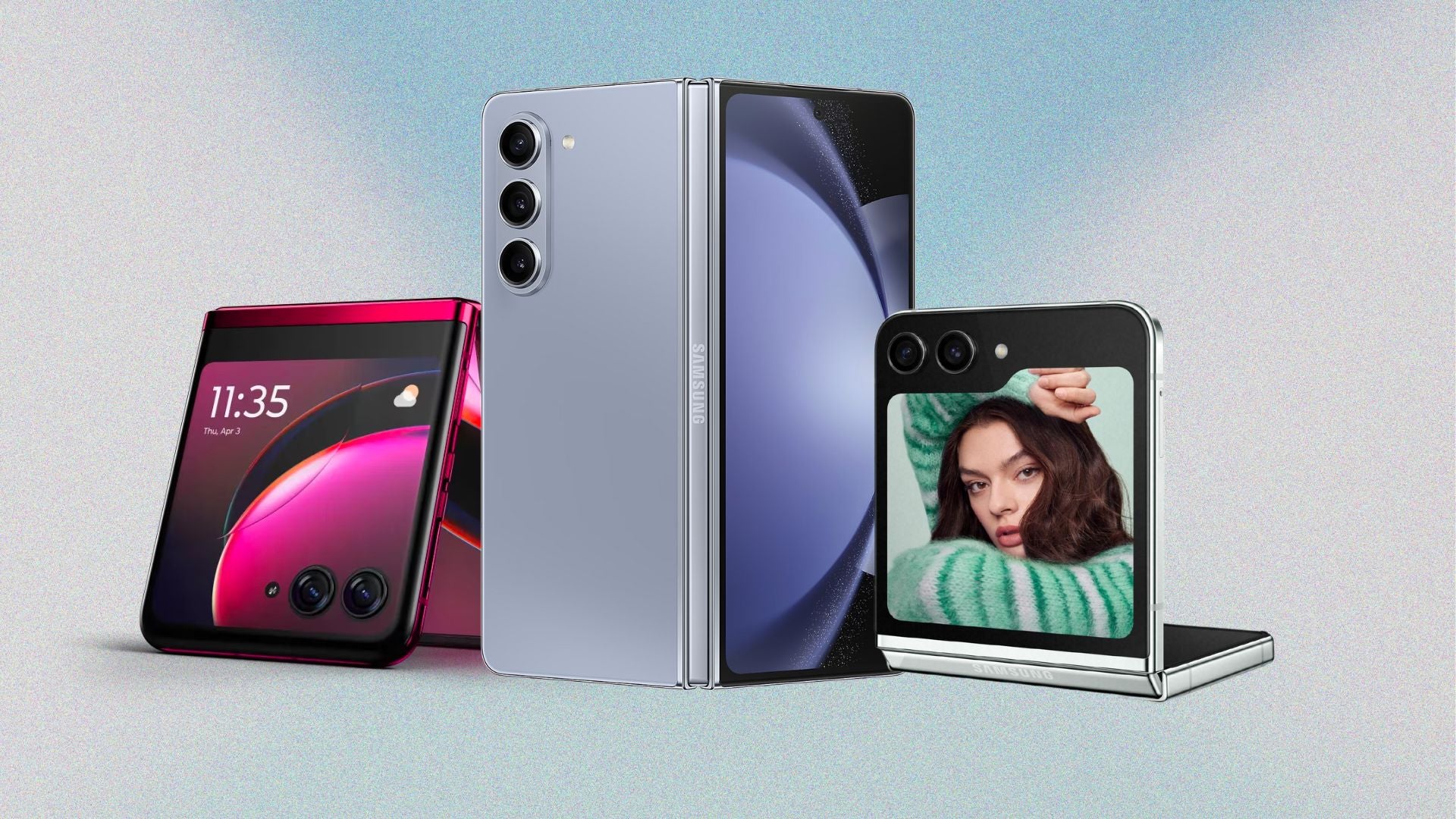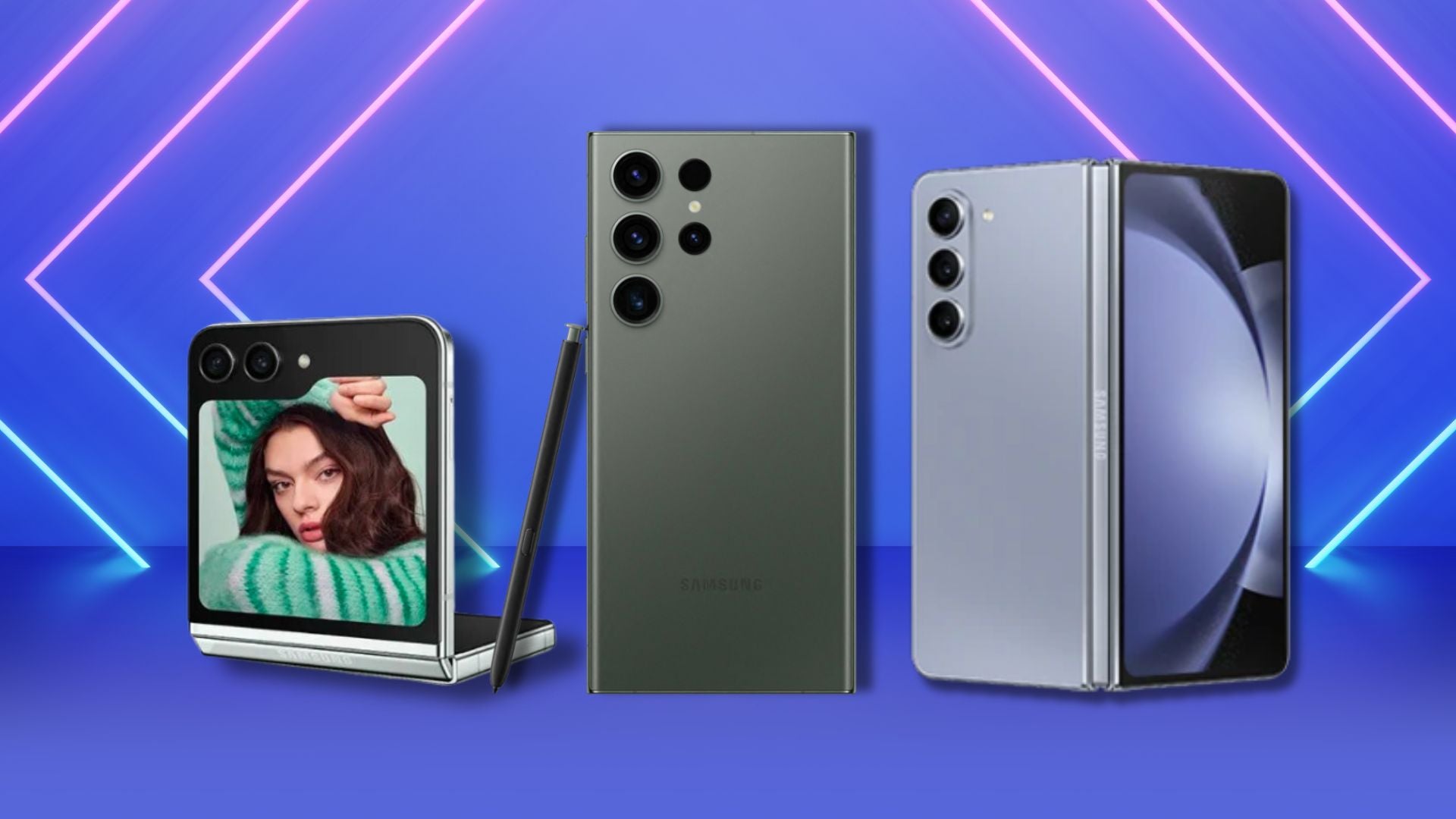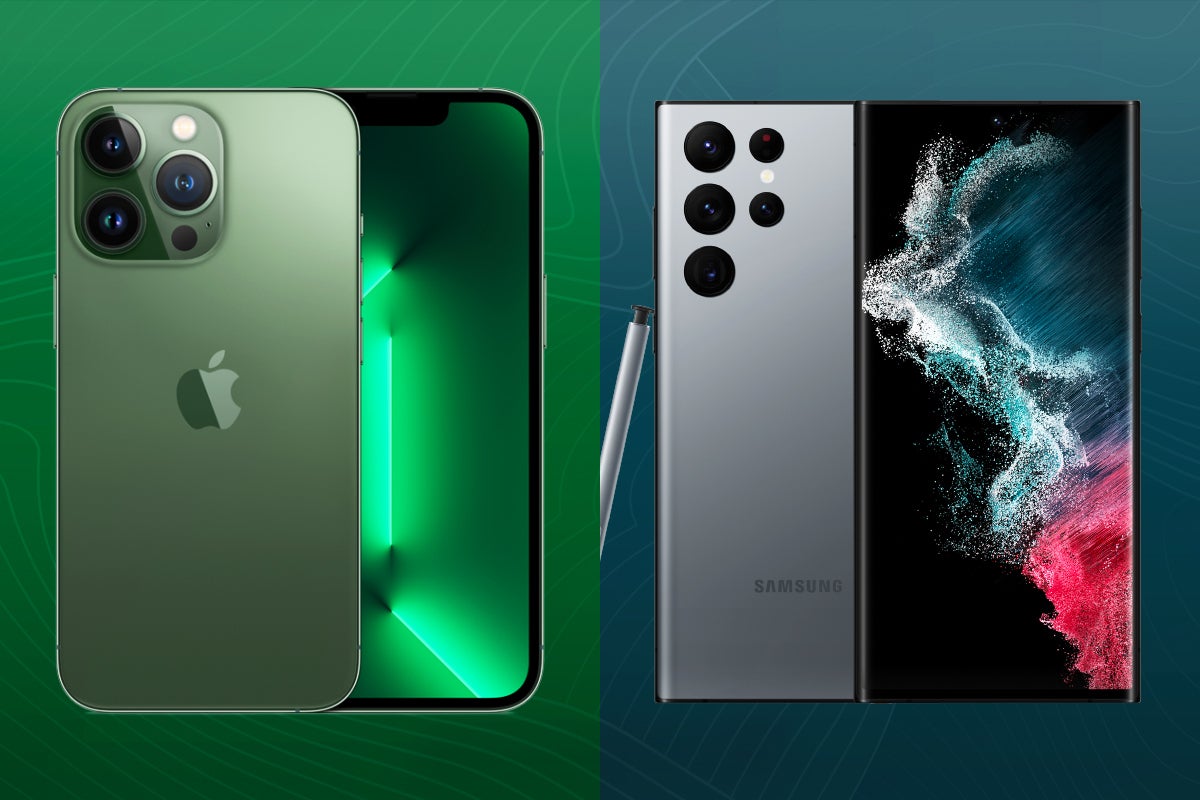Samsung Galaxy Z Fold 4 Review
A more refined foldable
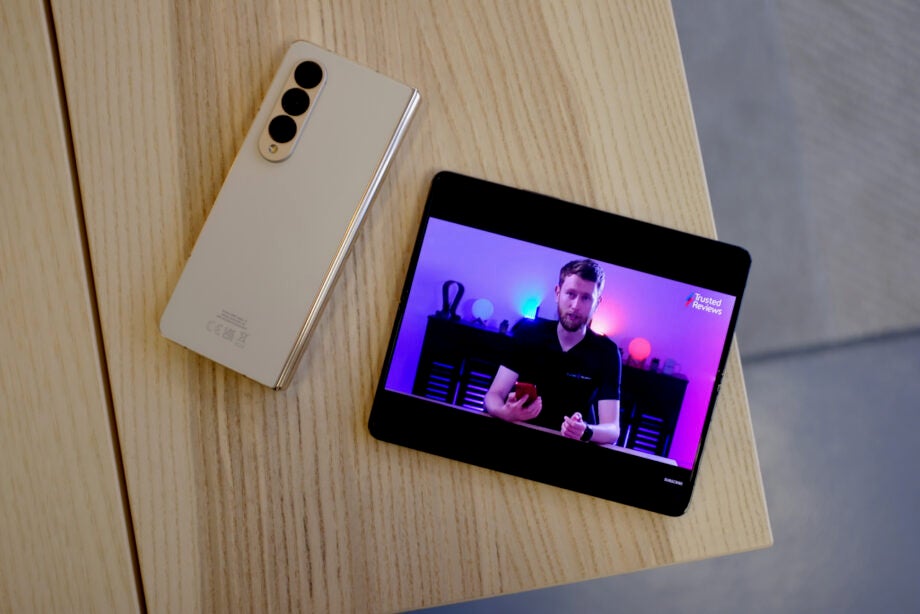

Verdict
The Samsung Galaxy Z Fold 4 still feels like a futuristic smartphone a year after launch, but with the introduction of the Z Fold 5 with an improved hinge, better performance and a brighter display, it’s not quite as tempting an option as it once was.
Pros
- Smart UI tweaks
- Camera no longer an issue
- The form factor really does work
Cons
- Lack of apps making true use of the big inner screen limits usefulness
- Crease and thick body remain from the previous iteration
- Price still puts it out of reach for most
Availability
- UKRRP: £1649
- USARRP: $1649
- EuropeRRP: €1799
- CanadaRRP: CA$2500
- AustraliaTBC
Key Features
- Focus on durabilityIPX8 rating for water resistance and Gorilla Glass Victus
- Top-end internalsSnapdragon 8 Plus Gen 1 chipset, 12GB RAM and up to 1TB storage
- Two displaysOne outer 6.3-inch panel and another, larger 7.6-inch screen inside
Introduction
Samsung’s Fold series has come a long way since its disastrous debut, which saw the first-generation model all but fall apart in my hand.
The Z Fold 4 represented the pinnacle of Samsung’s foldable tech at launch in 2022. Even though it wasn’t a huge change from the Z Fold 3, it boasted key improvements that made it feel more reined.
The problem is that the Z Fold 5 is now here, offering even more improvements to the book-style design, including a much-improved hinge mechanism that’s both more durable and all but removes the gap when folded and boosted performance in the form of the Snapdragon 8 Gen 2 for Galaxy. That makes the Z Fold 4 a little less tempting than it did at launch in 2022.
Still, if you can find the Z Fold 4 at a discount and you’re happy to accept the slight technical differences, the Fold 4 remains a tempting option.
Screen and Design
- Foldable form-factor delivers a smaller outer display and a larger, tablet-like panel inside
- Far more durable than the first few iterations of the Fold
- Wildly versatile device
Samsung has stood firm in what it believes a flagship foldable smartphone should look like, and the Z Fold 4 concurs on that front.
While the Z Flip4 and newer Z Flip5 are for people that want a foldable simply for the fact that the concept takes a standard smartphone and makes it smaller, the Z Fold 4 and 5 actually make the most of the folding display tech in my mind. This is both a phone and a tablet, delivering a bigger screen for those times you want to watch a video or play a game, and becoming smaller for everything else.
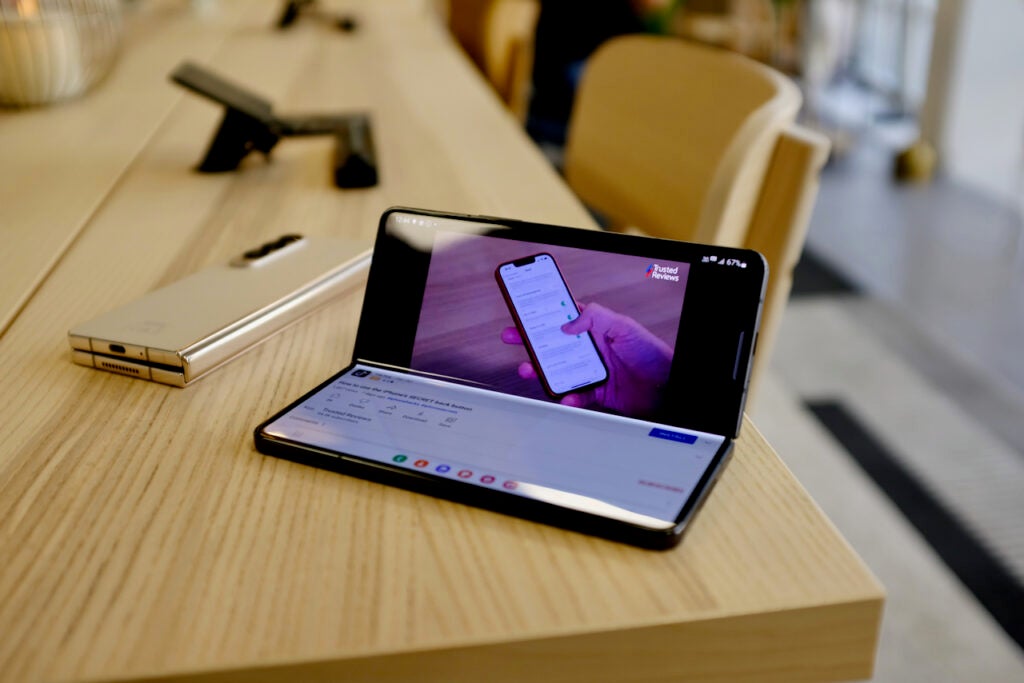
The blueprint for this Z Fold 4 is the same as all the previous versions of the phone. The phone is home to a smaller outer panel and a larger, 7.6-inch inner display that folds out. Samsung has made the screen slightly wider this time round, with a 23.1:9 aspect ratio on the inside. The change isn’t monumental, but it does make the experience of watching wider content a little better.
Having a wider outer display is a bonus too, since using the Z Fold 4 feels like using a regular phone. You won’t be playing games or watching videos here, but it’s handy for WhatsApp and Google Maps – or simply answering phone calls.
It’s an experience that Samsung continues with the Z Fold 5, with no difference to the size of either display, so you’re not missing out on much by going with the year-old model.
The Fold 4 is marginally lighter than the Z Fold 3, weighing 263g instead of 271g. That might appear like a minor reduction, but I noticed the lighter frame immediately. The Z Fold 4 remains a thick phone, however. Roughly the thickness of the two iPhone 13s, it can be tricky to fit in smaller pockets or bags.
It’s worth noting that Samsung has managed to reduce the Z Fold 5’s thickness, measuring in at 13.5mm thick when folded, and unlike the Fold 4, there’s no annoying gap between the two halves of the fold either. These aren’t monumental changes but they do make the phone appear more premium.
The inner screen itself is packed with all the usual high-end features you’d find on a phone at this price. Samsung claims it can hit 1000 nits of peak brightness in HDR situations, packs a 120Hz adaptive refresh rate for smooth scrolling, supports the S Pen stylus, and has a camera tucked beneath.
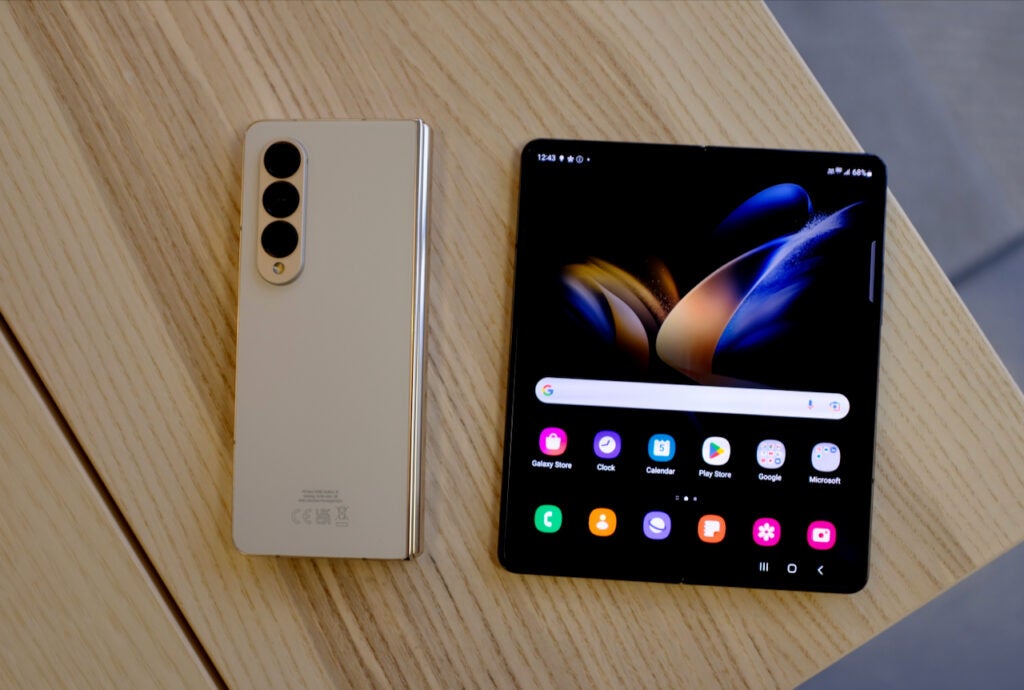
It’s fair to say that the under-display camera (UDC) on the Z Fold 3 was terrible, and I can’t say there’s been much of an improvement here. It’s hard to spot the sensor unless you’re actively looking for it – or you’re on a white page – but the overall quality of snaps is murky and washed out. I think the purpose of this camera is more for basic video calls rather than snaps of yourself, and as such, its quality isn’t overly important to me.
The biggest issue with the display remains, though – and that’s the crease. While other foldables from the likes of Oppo and Xiaomi have managed to work at removing the annoying line down the middle of the screen, Samsung doesn’t seem to have bothered. It’s as distracting as it was on the very first Fold device – and that’s disappointing.
Following use of the phone for a week, the crease does start to become less of an issue – until I scroll down a page and my finger runs over it. It’s also a lot more obvious when using the phone outdoors and on brighter days, since sunlight reflects off it.
It’s also not something that has improved much with the newer Z Fold 5.
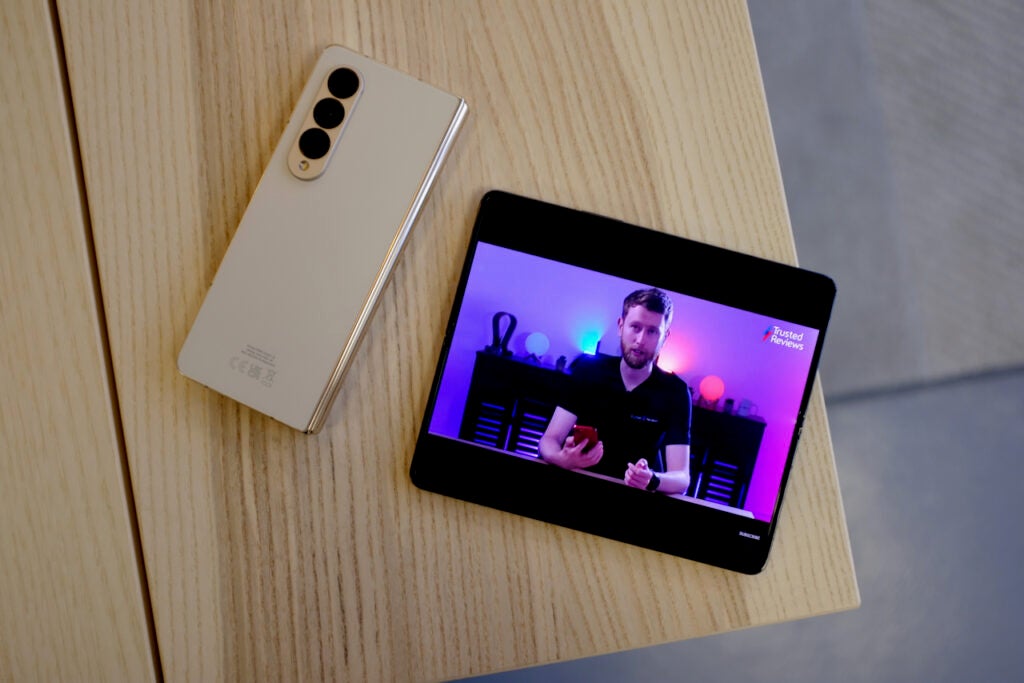
Nevertheless, the quality of actual content reproduced on the screen is great. I’ve watched countless hours of Netflix on the Tube and read two books through the Kindle apps through the review process – something I’d never have done on a typical Android phone. Yet, the surface of the screen is very different to something like the Samsung Galaxy S22 Ultra. The use of ultra-thin glass offers up a plasticky, overly reflective finish that I’ve found becomes grubbier a lot quicker than normal glass.
The Z Fold 4 remains one of the only foldable phones around with an IPX8 water-resistance rating, and it has Gorilla Glass Victus Plus covering the front display. Tough aluminium remains around the sides and Samsung says it’s tweaked the hinge slightly this year, too.
It’s quite incredible how far Samsung has come in such a short amount of time in terms of durability here, especially when you consider how terrible the first version was. You still need to be careful, of course, but I don’t find myself taking any more care of the Z Fold 4 than I’d do with other phones.
Camera
- Camera no longer a reason not to buy
- Not as good as the best around, but very capable
- Only real letdown is the under-display camera on the inside
Samsung spent a lot of time ahead of launch hyping up the improvements it’s made to the camera, and while the company doesn’t come close to the quality on display in the Galaxy S22 Ultra in all situations, it’s on par with the S22 and S22 Plus.
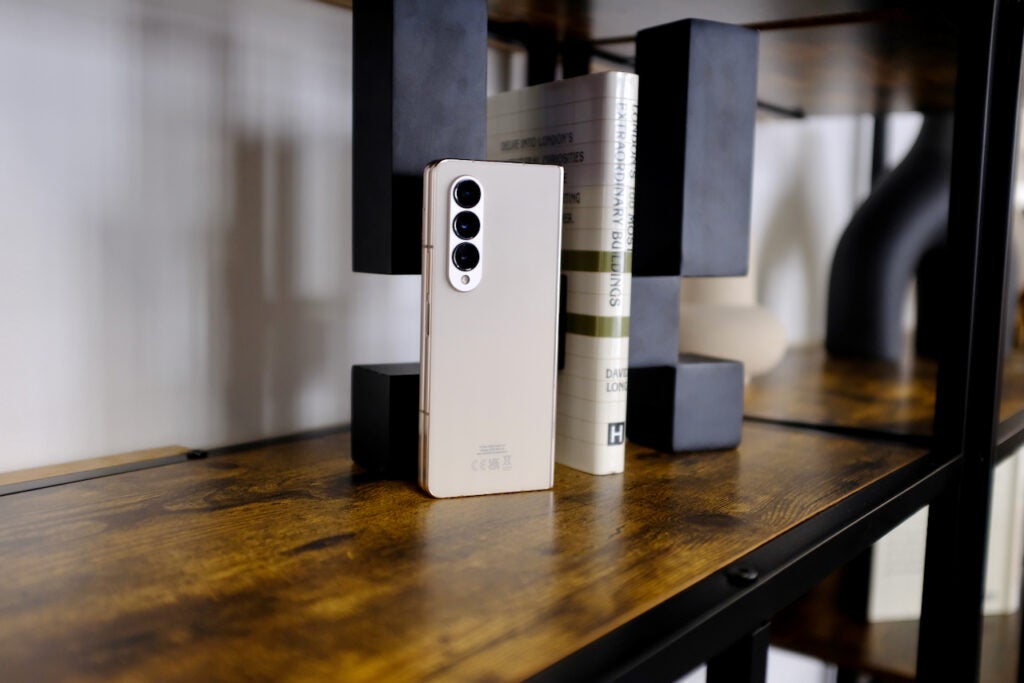
This isn’t the best camera phone going, then, but the cameras no longer feel like a reason to avoid a Z Fold device.
On the back of the Galaxy Z Fold 4 you’ll find three cameras: a main wide 50-megapixel unit, a 12-megapixel ultra-wide, and a 10-megapixel zoom lens with 30x digital zoom and 3x optical. There’s also a 10-megapixel camera on the front and, as mentioned, that 4-megapixel under-display camera inside the internal display. You’re certainly not short of snappers here.
Samsung told me ahead of the launch that the main sensor offers 23% brighter pixels, and this plays into the focus on low-light performance in the Nightography photography modes. The company also said that low-light video should be more stable.

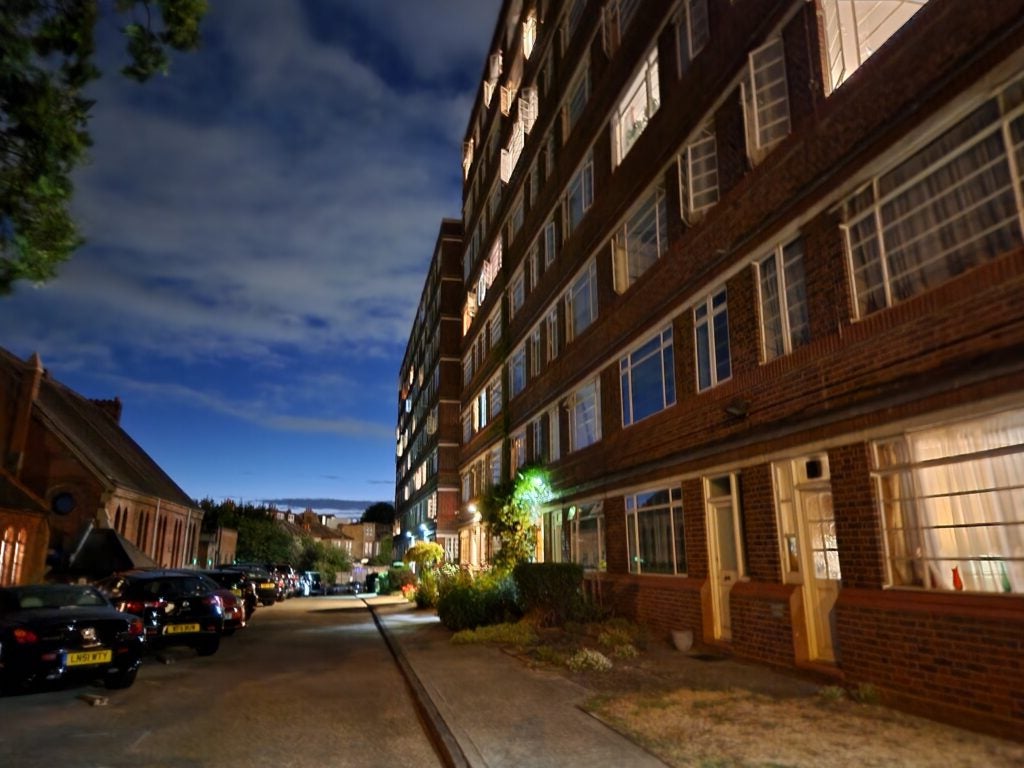
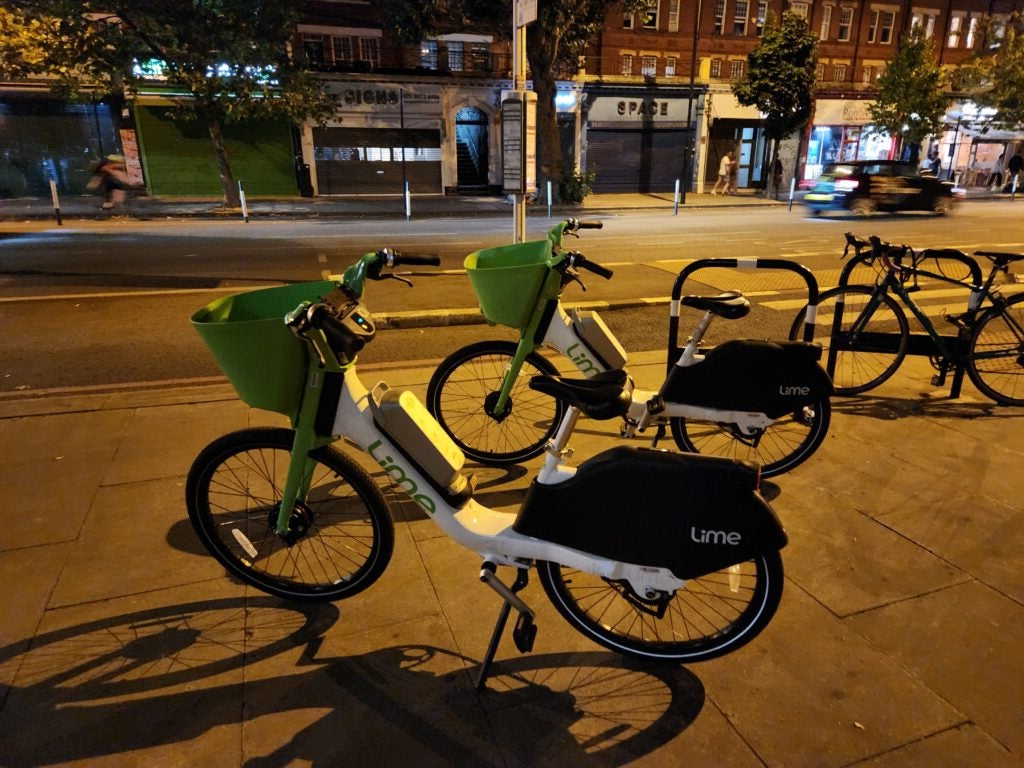
Both of those claims are perfectly valid; I’ve been impressed by the low-light performance of the Z Fold 4. It can bring out the brightness in dark bar scenes and landscapes, with the software doing much of the heavy-lifting. It isn’t as capable as the Pixel 6 Pro, which I found reproduced skin tones better, displaying greater realistic detail; but most of the snaps were usable and this wasn’t something I’d have said about previous Fold phones.
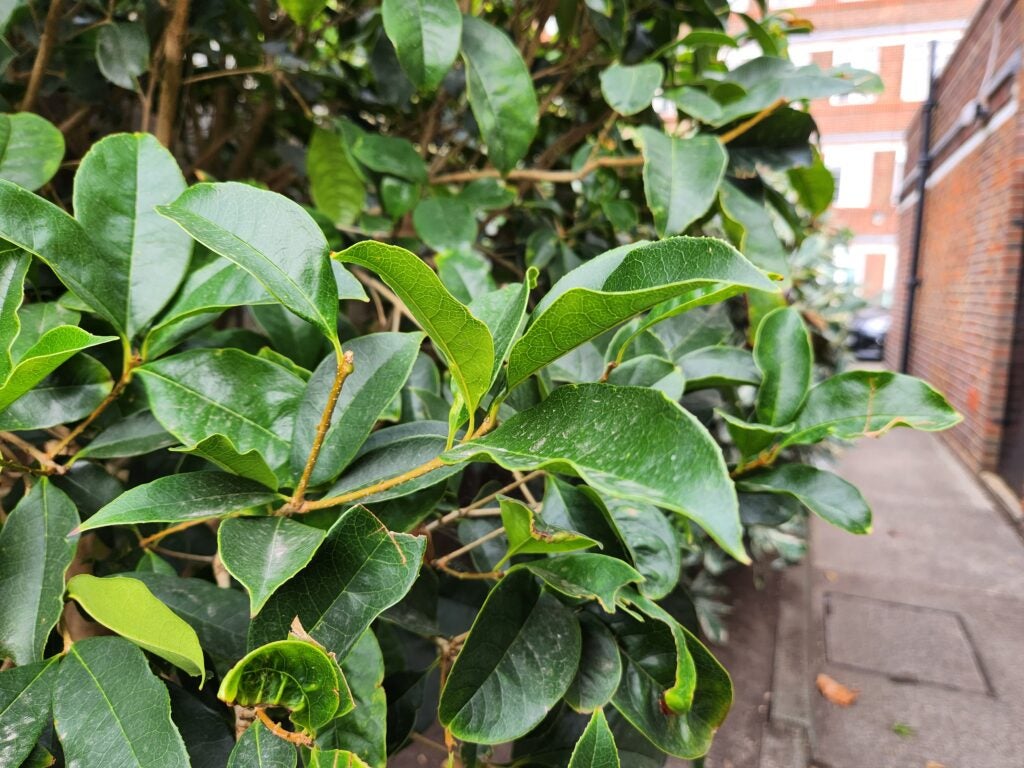
For snaps taken in bright, well-lit environments, I think you’ll be hard-pushed to tell the results from the 50-megapixel main camera apart from the competition.
Colours pop with a little more saturation than the same shot taken on an iPhone 13 Pro Max, which might be more pleasing to those who view most of their photos on a phone.

Blues in shots of the sky, or the green in plants display plenty of punch, although not to the extent that they look lurid. Skin tones aren’t as natural as those on snaps taken with the Pixel 6 Pro or iPhone 13 Pro, with some detail lost – that’s just me nit-picking, though.


The most obvious area where the Z Fold 4 loses ground to the Galaxy S22 Ultra is with the zoom. The 3x optical lens here is merely adequate, and the AI-assisted 30x Space Zoom usually left me with a grainy image. This isn’t true zoom in the way the S22 Ultra has a system built for zoom photography, but rather a neat extra that you can switch to when you really need to get closer to a subject and are happy to accept some loss in quality.
Importantly, Samsung has included the same camera hardware in the Z Fold 5, so you won’t see any meaningful boost to camera quality by opting for the newer model.
Performance
- Top-end specs deliver excellent performance
- Software tweaks help make better use of the display
- Most apps still don’t make use of the big display
Powering the Galaxy Z Fold 4, across all regions, is Qualcomm’s 8 Plus Gen 1 chipset. There isn’t a version of the device with an Exynos alternative available – a change from Samsung’s release strategy with S-series phones.
This is a supremely capable chip – in fact, it was the top-end chip available at launch. It’s efficient, pumps out strong scores in our suite of benchmark tests, and hasn’t felt slow or laggy at all during my week with the phone. Considering the price of the Z Fold 4, I wouldn’t really expect anything less.
Gaming on the inner display is a joy, especially with a controller attached. The Qualcomm chip has no trouble handling even the most intensive titles on high graphical settings. The 12GB of RAM is also more than sufficient for the multiple apps I use on a daily basis to stay in memory, not requiring constant reloading.
It’s worth noting that the Z Fold 5 is even more powerful with Snapdragon’s exclusive Snapdragon 8 Gen 2 for Galaxy, making the Fold 5 one of the most powerful smartphones around in 2023, not just in terms of foldables. However, you’re not likely to notice a difference in day-to-day use, with both smartphones delivering a comfortably powerful, smooth experience.
The base model comes with 256GB of storage, but the lack of SD expansion means you might want to spend even more if you’re planning on loading this device with content.
Many of the more significant changes are focused on the software. The Z Fold 4 runs a form of Android 12L – a version of Google’s OS designed specifically for larger phones and tablets – alongside the One UI software. This is the first device I’ve used to be running Android L and it certainly feels like a strong start.
One of the most obvious additions is a desktop-style taskbar. This sits at the bottom of the screen and displays more apps than the typical Android dock. It can also be pulled up when you’re in other apps, allowing you to open multiple apps at once without having to jump back to the homescreen. While this idea isn’t anything new, feeling similar to the setup on iPadOS, it makes such a difference in actual use.
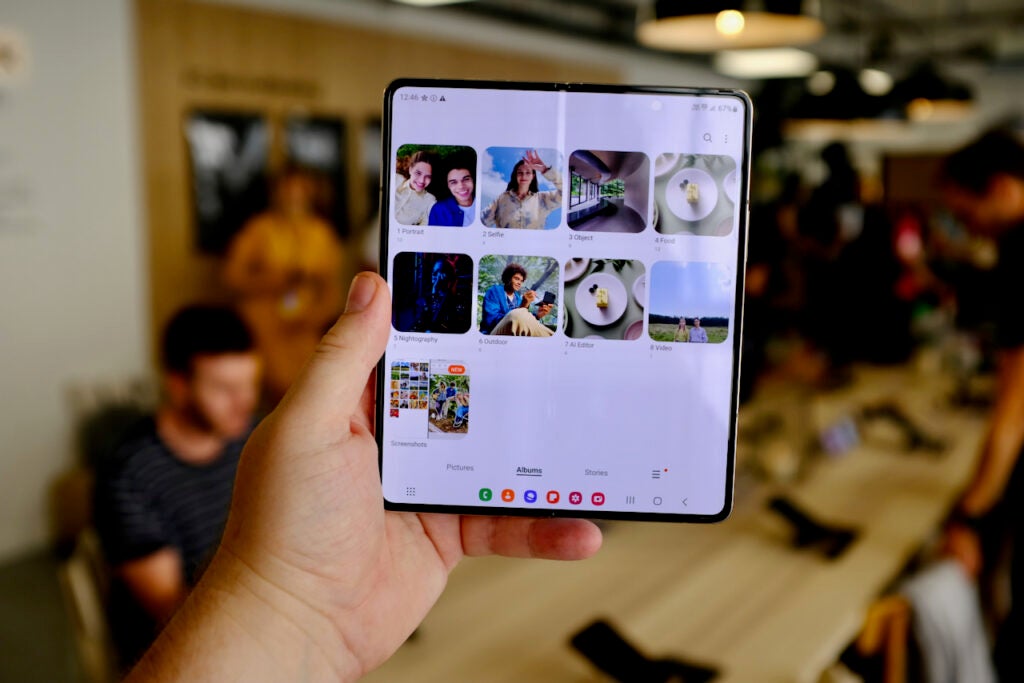
Throughout my time with the Z Fold 4, I’ve found myself multitasking far more than I have on a phone before. With the screen unfurled, you can have three apps visible at once, with the squared-off display making each one usable. You can pull apps out into floating, resizable windows too.
The situation with apps is less of a win – especially in terms of third-party services. All of Samsung’s own apps are great, making excellent use of the display, as do most of Microsoft’s. Spotify defaults to a tablet-like state that crams more information into view, making it feel like the bigger screen is actually a benefit.
When I initially went hands-on, the majority of the apps I used on a daily basis appeared to be just stretched phone apps that look fine on the outer display but odd on the inside. Instagram stretched pictures out far too much, as did BBC Sport and Audible. These apps weren’t designed for a square screen of this size and it really showed.
However, the situation has changed somewhat in 2023, with more big-name apps like Instagram and Reddit now offering dedicated full-screen designs for the Z Fold 4 and newer Fold 5. It’s still not perfect but it’s a vast improvement in just a year, and it’s a much better experience than you’ll find from the likes of the Google Pixel Fold.
Battery Life
- Lack of charger feels stingy at the price
- 25W maximum speeds are far from the best around
- Wireless charging available
There’s a 4400mAh battery inside the Z Fold 4 – which is identical to the unit in the Z Fold 3, and the newer Z Fold 5 – along with fast wired and wireless charging. This remains a fairly small cell considering the need to power two screens. Battery life is slightly better than we achieved with the Z Fold3, likely due to the more efficient chipset tucked inside.
Throughout my week with the Z Fold 4, I’ve managed to always get through until bedtime with at least 15% battery life remaining. This is with roughly five hours of screen-on time per day. You can get more with other Android handsets, and certainly with the iPhone 13 Pro Max, but considering I used the inside display plenty for Kindle reads and watching YouTube on the train each morning, I’m actually fairly impressed with the endurance on offer here.
Obviously, the battery will drain far more quickly if you’re playing games on the inside display, but it’s also easy to eke it out by using just the outer panel.
This is largely what you’ll get from the Z Fold 5 too, with our reviewer finding it’d get to bedtime with at least 20% charge left in the tank – and that’s with multiple hours of use during the day.
Usually, I wouldn’t bemoan the lack of a charger inside a phone box, but when a phone costs this amount, it really should come with the fastest-possible unit.
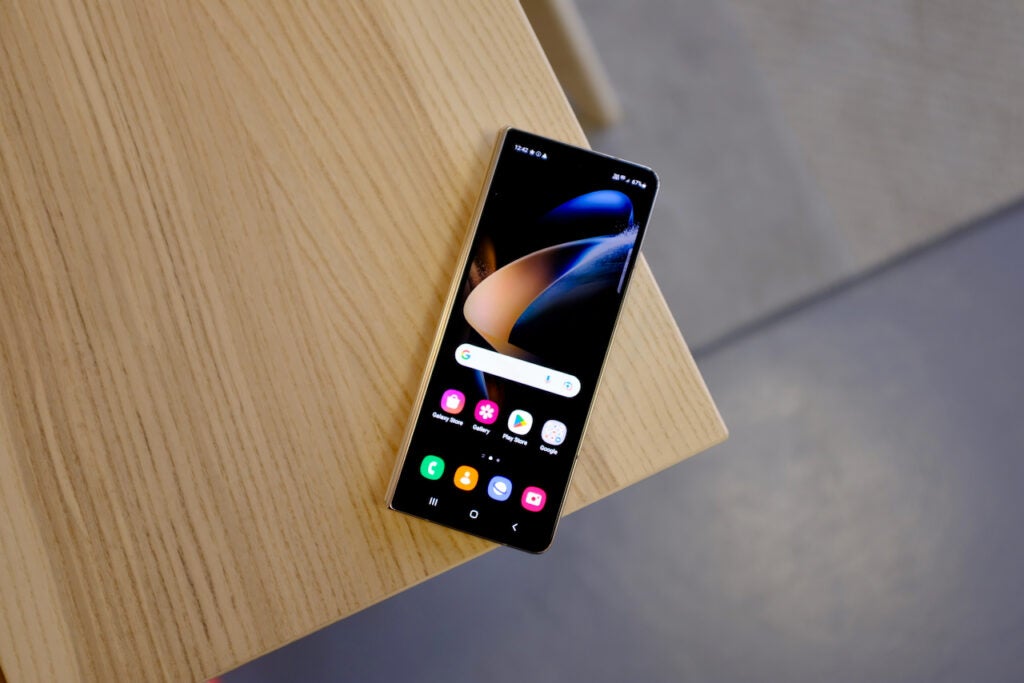
Fast charging has never been a key skill of Samsung’s phones, and that doesn’t change here. The Z Fold 4 supports a maximum 25W, and using a capable plug it topped up from 0-50% in 30 minutes. That’s fine, but it then took on average a further 60 minutes to reach 100%. Having recently used the OnePlus 10T, a phone that can be charged from 0-100% in just 19 minutes, I felt I was spending a lot of time hanging around for this phone to charge.
Latest deals
Should you buy it?
You want a tablet and a phone in one: The Galaxy Z Fold 4 is the only device around that blends both a tablet and a phone. The inner display is better for reading, watching and browsing than any other phone I’ve used.
You want a pocketable device: Even though The Z Fold 4 is lighter than the previous model, it remains a chunky, weighty phone that won’t comfortably slip into smaller pockets.
Final Thoughts
The Samsung Galaxy Z Fold 4 is a minor upgrade in many ways – Samsung has taken an already good phone and added finesse to some areas to make it slightly better.
The wider screen is welcome, if not a game-changer, and the improved chip and camera are also welcome. Samsung has done its best with the software, too, although until developers and Google really start pushing this screen size, you’re left with a majority of apps that don’t feel quite right.
It’s also hard to ignore the price. At the high price, this device will be out of reach for many – while also being a ludicrous amount to spend on a phone that isn’t necessarily better in any single area than a device costing half the price. The situation is. a little more tempting with the reveal of the Z Fold 5 however.
While the Fold 5 boasts key improvements to the hinge, chipset and display, the Z Fold 4 is now cheaper than ever, making it a tempting buy considering just how similar the two are.
How we test
We test every mobile phone we review thoroughly. We use industry standard tests to compare features properly and we use the phone as our main device over the review period. We’ll always tell you what we find and we never, ever, accept money to review a product.
Used as our main handset for a week during test period
Camera compared to rivals
Tested with synthetic benchmarks and real world use
FAQs
There’s no charger included; there’s just a USB-C cable in the box. The phone supports up to 25W charging.
While the Z Fold 4 supports S Pen input for notes or doodles, you’ll have to buy it separately.
Trusted Reviews test data
Full specs
Sustainability
TrustedReviews’ holds the fact that global warming is not a myth as a core value and will continuously endeavor to help protect our planet from harm in its business practices.
As part of this mission, whenever we review a product we send the company a series of questions to help us gauge and make transparent the impact the device has on the environment.
We currently haven’t received answers to the questions on this product, but will update this page the moment we do. You can see a detailed breakdown of the questions we ask and why in our sustainability info page.
Jargon buster
IP rating
An abbreviation for ‘Ingress Protection Code’, which lets you know to what extent a device might be waterproof or dustproof.Nits
The brightness level of a display. 300 nits is regarded as the minimum target for high-end screens.

